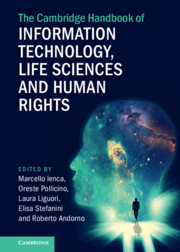Book contents
- The Cambridge Handbook of Information Technology, Life Sciences and Human Rights
- The Cambridge Handbook of Information Technology, Life Sciences and Human Rights
- Copyright page
- Contents
- Tables
- Contributors
- Acknowledgements
- Introduction
- Part I Life Sciences and Human Rights
- 1 M-Health at the Crossroads between the Right to Health and the Right to Privacy
- 2 Neurorights and the Chilean Initiative
- 3 Persuasive Technologies and the Right to Mental Liberty
- 4 The Ethics and Laws of Medical Big Data
- 5 The Right to Have a Child
- 6 Medical Robots and the Right to Health Care
- 7 Life-Maintaining Technology and the Right to Die
- 8 The Spread of Telemedicine in Daily Practice
- 9 Reproductive Technologies and Reproductive Rights
- Part II Information and Communication Technologies and Human Rights
- Part III Towards a Convergence
2 - Neurorights and the Chilean Initiative
from Part I - Life Sciences and Human Rights
Published online by Cambridge University Press: 17 May 2022
- The Cambridge Handbook of Information Technology, Life Sciences and Human Rights
- The Cambridge Handbook of Information Technology, Life Sciences and Human Rights
- Copyright page
- Contents
- Tables
- Contributors
- Acknowledgements
- Introduction
- Part I Life Sciences and Human Rights
- 1 M-Health at the Crossroads between the Right to Health and the Right to Privacy
- 2 Neurorights and the Chilean Initiative
- 3 Persuasive Technologies and the Right to Mental Liberty
- 4 The Ethics and Laws of Medical Big Data
- 5 The Right to Have a Child
- 6 Medical Robots and the Right to Health Care
- 7 Life-Maintaining Technology and the Right to Die
- 8 The Spread of Telemedicine in Daily Practice
- 9 Reproductive Technologies and Reproductive Rights
- Part II Information and Communication Technologies and Human Rights
- Part III Towards a Convergence
Summary
Neurorights are novel human rights that specify areas of protection from potential abuses of neurotechnologies. They protect mental privacy, mental freedom and fair access to neuroenhancement. We discuss neurorights research and advocacy, including the Chilean constitutional amendment and neuroprotection bill of law, which explicitly protect neurorights and adopt a medical model for the regulation of all neurotechnologies, defining them as medical devices. These Chilean bills could serve as a model for legislation elsewhere.
Keywords
- Type
- Chapter
- Information
- Publisher: Cambridge University PressPrint publication year: 2022

